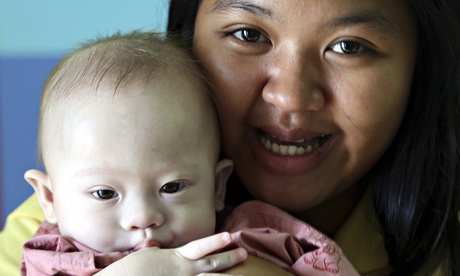
I have three daughters. The youngest, twins Kiara and Francesca, were born through surrogacy. The tragic case of baby Gammy, a twin born through surrogacy with Down’s syndrome and a heart condition, led me to despair. Not only because of the story itself, but also over the incredible lack of understanding of the issues involved and the reactionary language used by some commentators.
Surrogacy usually features in the media in one of two ways. When it involves celebrities like Sarah Jessica Parker or Elton John, it is presented in the fawning style favoured by Hello magazine. Either that, or it hits the headlines because either the intended parents or the surrogate has reneged on the agreement, with tragic consequences for all.
These are two ends of the surrogacy spectrum and I am sharing my experience to present a view of what lies between. I hope that it may help to shift the debate from provocative headlines to a meaningful discussion of solutions.
After our eldest daughter was born in 2006 I had a massive haemorrhage and needed a life-saving hysterectomy. I was 33, crazy in love with my husband, Sebastian, and we had wanted two or five children, depending on which of us you asked. Having both grown up with siblings and appreciating the importance of that bond, we were determined to have another child and decided to adopt.
In 2007 the adoption rules in the UK emphasised matching children to parents of the same ethnicity and we were advised by our local authority that, as a German and South African of mixed race, we stood little chance of success.
Qualifying for international adoption so that we could be matched with a child from South Africa was an incredibly intrusive, expensive and lengthy process, but we were spurred on by our deep and visceral longing to have another child. While the South African authorities had assured us of our eligibility, by the time we were qualified in the UK, the law was being amended. Four years into the adoption process, I was told that the only way we would succeed would be to move to South Africa.
Though initially uneasy about entering into what appeared to be murky territory, we decided to investigate surrogacy. However, from the first meeting with our fertility specialist in Cape Town, our experience was a world away from the horror stories that make the news headlines.
The entire process was handled by a team of experienced professionals, who were vigilant about ensuring that each of us – surrogate and intended parents – had the support and guidance we needed.
Open contributions: International surrogacy – share your experiences
The first step was to be matched with a surrogate, and we were put in touch with a social worker, who introduced us to our surrogate. Though our first meeting felt awkward to begin with, we relaxed and found out enough about each other to make the decision to proceed.
Each of us was then assessed by a psychologist, who focused on how we would respond to the complex issues that the process would raise. For instance, we had to talk about what we would do should we find out that our foetus had Down’s syndrome and I had to confront my feelings about my infertility.
Our case was then considered by the clinic’s ethics committee before we could engage a legal team to draw up the surrogacy agreement and take our application for a parental order to the high court. The parental order identified us as the legal parents, which helps to prevent the tragedy of a baby Gammy scenario.
With the parental order, we could finally commence IVF and our surrogate fell pregnant after the third round. When I look at Kiara and Francesca now, aged two, full of beans, opinions and humour, I can’t imagine life without them. Yet I am also reminded how incredibly hard it was to have them.
International surrogacy is on the rise because “developed world” countries make it difficult for childless couples to access it at home. To take the UK example – we never considered surrogacy here because, while our twins are genetically ours, the surrogate would legally be recognised as the mother, exposing both parties to an incredible risk. In the “developing world”, the money that is received by the surrogate is a life-changing amount for her and her family.
It is easy to pass moral judgment on couples desperate to have a child or mothers desperate to improve their families’ circumstances from a position of privilege – of never having to personally confront either of those issues. What would be more helpful is to focus the debate on potential solutions, such as a Hague convention to regulate international surrogacy, similar to the one that deals with international adoption.

